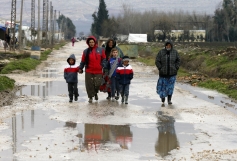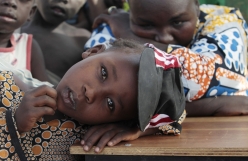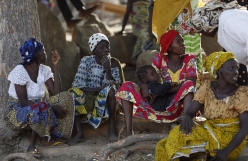Aid agencies working to protect and assist refugees in North Africa and the Middle East "continualy fall short," a new report has found.
A study commissioned by the organisers of the World Humanitarian Summit (WHS) interviewed individuals, civil society organisations, affected communities and government representatives in Egypt, Jordan, Lebanon, Palestine and Yemen.
Those interviewed "consistently expressed outrage at the staggering level of human casualties and suffering in the region's current humanitarian landscape," the report says.
"The current humanitarian system was cited as inadequate in the face of the changing humanitarian landscape in the region."
Affected people were asked to what degree they and their community felt that they were treated with respect and dignity by aid groups. The average score given across the five countries was 3.5 out of 10. In Lebanon, the figure was as low as 2.2 out of 10 for men, and 2 out of 10 for women.
Aid agencies didn't fare much better in other categories, scoring an average of 2.5 out of 10 for the way in which they helped people to prepare for future crises, and 3.5 out of 10 for making people feel safe and protected from violence.
Some criticised aid groups for their impartiality in offering assistance. "A lot of humanitarian actors do not provide aid based on needs alone. Many look at appearance, faith or political affiliation before assessing actual needs," a young female refugee in Egypt told researchers.
"When you decide to help someone you have to remove all their affiliations and simply treat them as humans," one female youth leader from Palestine said.
Overall, participants scored aid agencies just 4 out of 10 for being neutral and impartial. They also expressed concern about corruption within the agencies themselves, leading to calls for greater transparency and accountability on a local level.
Refugees said they needed more information about the aid they were being given. "Humanitarian organisations need to provide information about their services because it is not humane to respond to refugee information needs with 'I don't know,'" a refugee in Yemen explained.
The report concluded that "This highlights the importance of basic information as a primary need for affected communities.
"While it is widely acknowledged that people's needs and rights should guide all humanitarian action, efforts to achieve this continually fall short. Protection violations persist with little accountability, humanitarian access remains limited and humanitarian crises are becoming increasingly protracted.
"The global humanitarian architecture struggles to remain fit for purpose and has much room for improvement when it comes to fostering true collaboration between international, regional and local actors."
Katie Harrison at Tearfund told Christian Today: "The refugees I've met in the Middle East have already been through immense trauma and loss before we find them, and they're right to expect us to listen to them and try to understand their needs.
"It's immensely encouraging to have honest and robust feedback, and we work very hard to make sure the people we serve are able to influence our planning and tell us what they think is working and not working. In fact, we were one of the first aid agencies to achieve external accreditation for our standards of beneficiary accountability - that's the term in our sector for listening and responding to the people who come to us for help.
"It's hugely important to us, and we're glad that these kinds of conversations are becoming more common and are being made public."
















